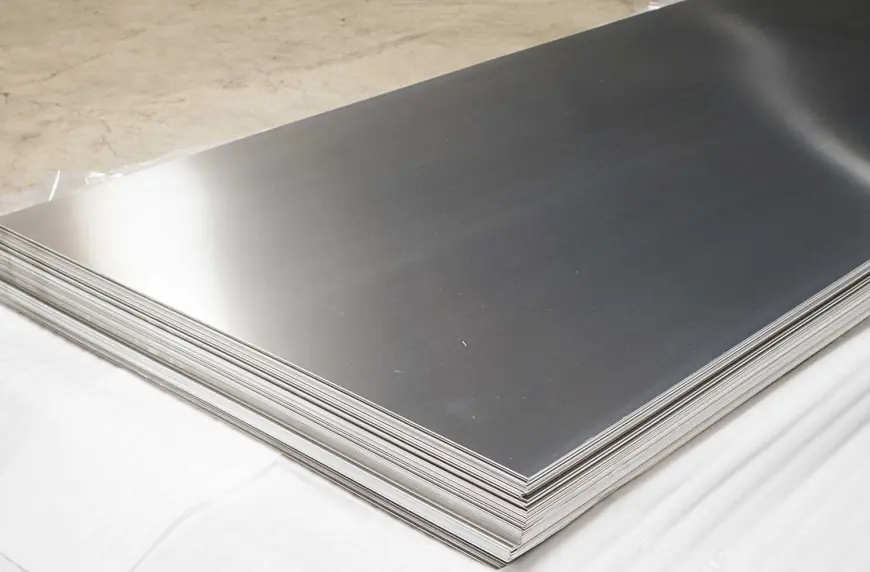Choosing the Right Stainless Steel 304 Sheet for Your Manufacturing Needs
Learn how to select the right Stainless Steel 304 Sheet for your manufacturing needs. Discover its benefits, applications, and key considerations for optimal performance.

When it comes to choosing the right material for manufacturing processes, stainless steel is often the material of choice due to its durability, corrosion resistance, and versatility. Among the many grades of stainless steel available, Stainless Steel 304 Sheet stands out as one of the most popular and widely used. This particular alloy offers a blend of excellent mechanical properties and corrosion resistance, making it suitable for a broad range of applications. In this article, we will explore the advantages of Stainless Steel 304 Sheet, the factors to consider when choosing it for your manufacturing needs, and the common industries that rely on this material.
1. What is Stainless Steel 304?
Stainless Steel 304, also known as 18/8 stainless steel, is an austenitic grade of stainless steel that contains 18% chromium and 8% nickel. These elements provide it with excellent resistance to oxidation and corrosion, making it ideal for applications in harsh environments. Stainless Steel 304 Sheet is widely used for applications requiring good weldability, formability, and resistance to corrosion in a wide range of atmospheric and chemical environments.
The versatility of this grade makes it suitable for various industries, including food processing, pharmaceuticals, construction, automotive, and chemical processing. Its resistance to corrosion, oxidation, and rust, as well as its strength and durability, have made it a preferred choice for many applications.
2. Advantages of Stainless Steel 304 Sheet
-
Corrosion Resistance: One of the primary reasons the Stainless Steel 304 Sheet is so widely used is its exceptional resistance to corrosion. It can withstand exposure to various acids, chlorides, and other corrosive substances, making it an excellent choice for use in industries such as food processing, pharmaceuticals, and chemical processing.
-
Durability: Stainless Steel 304 is highly durable and can withstand high temperatures and pressure. This makes it ideal for applications that require long-term performance in challenging environments.
-
Easy to Fabricate: Stainless Steel 304 Sheet is easy to fabricate, whether it’s through welding, bending, or cutting. Its malleability and ability to be formed into various shapes and sizes without compromising its strength make it a highly versatile material.
-
Aesthetic Appeal: Stainless Steel 304 Sheet is often used for applications where appearance is important, such as in architectural finishes or appliances. Its shiny surface and resistance to tarnishing ensure it maintains its appearance over time.
-
Hygienic: This stainless steel grade is easy to clean and maintain, making it ideal for industries like food processing, healthcare, and pharmaceuticals, where hygiene is of utmost importance.
3. Key Considerations When Choosing Stainless Steel 304 Sheet
When selecting Stainless Steel 304 Sheet for your manufacturing needs, there are several factors to consider to ensure that it will perform optimally for your application:
-
Thickness of the Sheet: The thickness of the Stainless Steel 304 Sheet plays an important role in its strength and durability. Thicker sheets are ideal for applications that require more robust material, such as structural components or heavy-duty equipment. On the other hand, thinner sheets may be more suitable for decorative or lightweight applications.
-
Finish: Stainless Steel 304 Sheets come in various finishes, such as matte, brushed, or mirror. The finish you choose will depend on the intended use and the aesthetic preferences of your project. A mirror finish, for instance, is often used for decorative purposes, while a matte finish may be more practical for industrial applications.
-
Formability and Weldability: Depending on the complexity of the manufacturing process, you may need a Stainless Steel 304 Sheet that is easy to form and weld. This material’s excellent weldability allows it to be used in a wide range of fabrication processes without compromising its structural integrity.
-
Environmental Factors: It’s important to consider the environmental conditions where the Stainless Steel 304 Sheet will be used. While Stainless Steel 304 is highly resistant to corrosion, it’s not immune to harsh environments. For extreme exposure to corrosive chemicals or high-temperature applications, you may need to consider other stainless steel grades or additional treatments to ensure long-term durability.
-
Cost and Availability: Stainless Steel 304 Sheets are available in a variety of sizes and thicknesses. The cost of the material can vary based on these factors, as well as on the supplier’s pricing and availability. It’s essential to balance cost and performance when making your choice to ensure you’re getting the best value for your investment.
4. Applications of Stainless Steel 304 Sheets
The versatility of Stainless Steel 304 Sheets allows them to be used in a wide range of industries and applications:
-
Food and Beverage Industry: Stainless Steel 304 Sheets are commonly used in the food processing and beverage industries for equipment such as tanks, pipes, and countertops. Their resistance to corrosion, staining, and rust makes them an ideal choice for environments where cleanliness and hygiene are critical.
-
Chemical and Pharmaceutical Industries: Stainless Steel 304 Sheets are used extensively in chemical processing plants, pharmaceutical manufacturing, and laboratories. The material’s resistance to chemical corrosion and high temperatures makes it an ideal choice for applications in these industries, where safety and performance are paramount.
-
Architectural Applications: Stainless Steel 304 Sheets are frequently used in architectural designs for facades, panels, and decorative elements. Their aesthetic appeal and resistance to tarnishing make them an excellent choice for both interior and exterior architectural applications.
-
Automotive Industry: In the automotive sector, Stainless Steel 304 Sheets are used for exhaust systems, engine components, and other parts that require durability and resistance to high temperatures and corrosion.
-
Marine Applications: Stainless Steel 304 Sheets are often used in marine environments due to their ability to withstand the harsh conditions of saltwater exposure. They are commonly found in boat parts, equipment, and other structures that need to endure constant exposure to moisture and corrosive elements.
5. Conclusion
Choosing the right material for your manufacturing needs is essential to ensure the quality and longevity of your products. Stainless Steel 304 Sheet offers an excellent combination of strength, durability, and corrosion resistance, making it a versatile and reliable choice for a wide range of applications. By considering factors such as thickness, finish, formability, and environmental conditions, you can select the right Stainless Steel 304 Sheet to meet the specific demands of your project. Whether you’re in the food industry, chemical processing, architecture, or any other sector, Stainless Steel 304 Sheets provide a durable and cost-effective solution that will serve you well for years to come.
What's Your Reaction?
 Like
0
Like
0
 Dislike
0
Dislike
0
 Love
0
Love
0
 Funny
0
Funny
0
 Angry
0
Angry
0
 Sad
0
Sad
0
 Wow
0
Wow
0












































